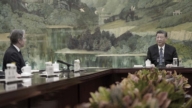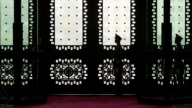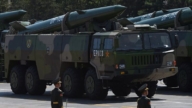【新唐人2013年04月05日訊】中國四川成都會展旅遊集團董事長鄧鴻,正在接受有關部門調查。傳他與去年底涉貪落馬的前四川省委副書記李春城關係密切。報導說,他旗下數十家經營實體牽涉的巨大利益最終流向何方,可能正是相關部門調查的重心所在。
現年50歲的鄧鴻,是四川成都會展旅遊集團董事長,集團旗下擁有世紀城新國際會展中心、九寨天堂國際會議渡假中心等多個項目。鄧鴻曾名列2006年《福布斯》中國富豪排行榜第328位,是身價超過9億元人民幣的四川會展王兼旅遊王。
3號,大陸《21世紀經濟報導》說,鄧鴻目前正在接受有關部門的調查。他旗下數十家經營實體牽涉的巨大利益最終流向何方,可能正是相關部門調查的重心所在。
鄧鴻被指與前四川省委副書記李春城關係密切,去年底,李春城涉貪落馬後,鄧鴻被傳曾遭有關部門約談,但他否認被調查。
早前媒體曾經報導,李春城是前中共政法委書記周永康的人,周下臺後,李春城涉及的大量貪腐事實,被中共新領導人習近平做為「反腐」典型開刀。
2月初,知情人士告訴博客「泛華網」,習近平決定提早摘除周永康這個毒瘤,而這次行動的第一功臣則是李春城,他供出了很多周永康的犯罪證據。
據了解,李春城不但涉及多起貪腐案,還涉買官賣官、以權謀私及中共高層權鬥等,案子都涉及周永康。另外,周永康的兒子在石油、地產以及投資「四川信託有限公司」等的商業利益上,李春城的貢獻最大。「四川信託」擁有很多國有資產,包括部分「五糧液」和「國窖」白酒的股份,他們投資2億元,就竊取了70億的國有資產。
去年底以來,四川已有3名富商被有關部門調查,其中包括「郎酒集團」董事長汪俊林,和持有香港身份證的「金路集團」董事長劉漢。據說,三人都與李春城關係密切,還有分析說,3人的被調查,很可能是習近平為捉拿周永康做準備。
時事評論家馬傑森指出,李春城和周永康都是從四川起家,說3名富豪與他們關係密切也不是空穴來風。
時事評論家 馬傑森: 「中國的這個體制裡頭,你要真的做大,成為大富豪,你沒有官方的聯繫是絕對不可能的,而官方也需要幾個富豪,作為自己的財路的來源,所以,富豪跟當地這種官員應該是有千絲萬縷關係的。」
馬傑森指出,如果習近平這一代領導人,掩蓋不住中共活摘人體器官的罪惡時,或許會拿周永康開刀。
傑森:「畢竟周永康做了一些極其令人髮指的一種迫害人類,反人類罪,比如說,活摘法輪功學員器官等等這樣的事情,他如果說,把周永康的罪狀抓的足夠多的話,必要的時候,也許可以讓周永康給整個中共背這個黑鍋。」
周永康轄下的政法委主導下的維穩體制,橫跨公檢法、監獄、信訪,造成中國冤民遍地,申冤無門。上月初,大陸維權律師浦志強在網路上舉報周永康禍國殃民,為非作歹十年,荼毒天下,他指出,中國要想從維穩的陰影下走出來,就必須清算周永康。
北京時政觀察人士華頗:「因為這暗含政治追殺的涵義,因為做為這種政治追殺, 那賈慶林是不是也會跟著受威脅,羅幹、曾慶紅牽扯麵實在太大了,習近平搞的,第一主要是政治委員這個級別,他的老虎級別是有嚴格限制的。」
去年王薄事發後,周永康、江澤民、曾慶紅、羅幹等多名中共高官活摘法輪功學員器官的事跡也在國際全面曝光,而他們已在全球30個國家,被起訴犯下「反人類罪」、「酷刑罪」及「群體滅絕罪」。
Sichuan Tycoon Probed for Involvement in Li Chuncheng Case
Deng Hong, a Sichuan tycoon, is being investigated
by the Chinese Communist Party (CCP) authorities.
Reportedly, he has close ties to Li Chuncheng,
who is Sichuang’s ex-Deputy Party chief.
Media said the official probe may aim to find
out the whereabouts of huge assets that
Deng Hong’s businesses are involved with.
50-year-old Deng Hong is president of the Exhibition &
Travel Group (ETG), in Chengdu, Sichuan Province.
ETG owns dozens of entities, including an international
convention centre, and an international holiday center.
In 2006, Deng Hong was ranked 328 in Forbes’
Billionaires List, with a wealth of over 900 million yuan.
On March 3, China’s “21st Century Business Herald”
reported that Deng Hong is under CCP investigation.
Where are ETG’s huge assets? The answer
may be what the investigation aims to find out.
Reportedly, Deng Hong has close ties to Li Chuncheng,
the former Deputy Party Chief of Sichuan.
At 2012 year-end, Li was arrested on charges of corruption.
Deng Hong was questioned by the relevant
authorities, and Deng denied involvement.
According to earlier media reports, Li Chuncheng’s
patron is Zhou Yongkang, the former security czar.
After Zhou’s tenure ended, Li Chuncheng got the
axe by Xi Jinping, as part of Xi’s anti-corruption drive.
In early February, a news report
on panchinese.blogspot.com.br quoted an inside source.
It said that Xi Jinping has decided to
purge Zhou Yongkang ahead of schedule.
Li Chuncheng was said to have contributed greatly to it,
with his confession about Zhou’s many criminal activities.
Media reported that besides his involvement
in corruption, Li Chuncheng was accused
of buying and selling official positions.
In addition, he abused power and
was involved in high-level infighting.
Zhou Yongkang was implicated in all the concerned cases.
Li Chuncheng also offered great help to Zhou Yongkang’s
son, to be able to reap huge profits from oil, real estate
and investment in Sichuan Trust Co., Ltd.
Sichuan Trust owns many state-owned assets, including
stocks in vintage liquor “Wuliangye” and “Guo Jiao”.
By investing 200 million yuan in the Sichuan Trust, they
acquired state-owned assets worth over 7 billion yuan.
Since the end of 2012, three wealthy businessmen
in Sichuan have been put under official probes.
They included Wang Junlin, president of Langjiu Group,
and Liu Han, president of Jinlu Group.
Media said these three people, and
Li Chuncheng, shared close relationships.
Analysts said that the investigation into the three men
may pave the way for Xi Jinping to catch Zhou Yongkang.
Critic Jason Ma says that Li Chuncheng and
Zhou Yongkang both got their starts in Sichuan.
It isn’t groundless about their
close links with the three tycoons.
Jason Ma: “In China, it’s impossible to become a
tycoon without having connections to the authorities.
Meanwhile, the authorities are willing to take
some wealthy men as a source of their income.
So there are complex links
between rich men and local officials.”
Jason Ma speculates that if the new CCP leadership
team fails to hide the evidence of organ harvesting,
they may take an axe to Zhou Yongkang.
Jason Ma: “Anyway, Zhou Yongkang is one of main
culprits who has committed crimes against humanity.
An example is live organ harvesting
from Falun Gong practitioners.
If the new CCP administration has obtained
sufficient proof to convict Zhou Yongkang,
they might let him carry the blame for the CCP.”
Zhou Yongkang, the former head of CCP’s Political and
Legislative Affair Committee (PLAC), had control of the
police, the procuratorate, courts, prisons, and petitions.
Zhou dominated a “stability preservation” system,
which has created numerous injustices across China.
Early in March, Pu Zhiqiang, a Beijing human rights
lawyer, denounced Zhou Yongkang on the internet.
Pu said that during his ten years of tenure,
Zhou has committed all kinds of evils in China.
According to Pu, China has to purge Zhou Yongkang
before it can really step out of the dark shadows.
Hu Po, political observer: “It implies a sort of political killing.
Will Jia Qinglin, Luo Gan, and
Zeng Qinghong be threatened next?
That will involve a wide initiative.
Xi Jinping is now targeting CCP politburo members.
These “tiger” officials, in his words, are strictly defined.”
In 2012, the crimes of Wang Lijun and Bo Xilai were exposed.
Since then, atrocities of the CCP removing organs from living
prisoners of conscience have been unveiled to the world.
These crimes have been controlled by top
level CCP officials, including Zhou Yongkang,
Jiang Zemin, Zeng Qinghong and Luo Gan.
So far, they have been sued in 30 countries, on charges
of crimes against humanity, torture and Genocide.




























